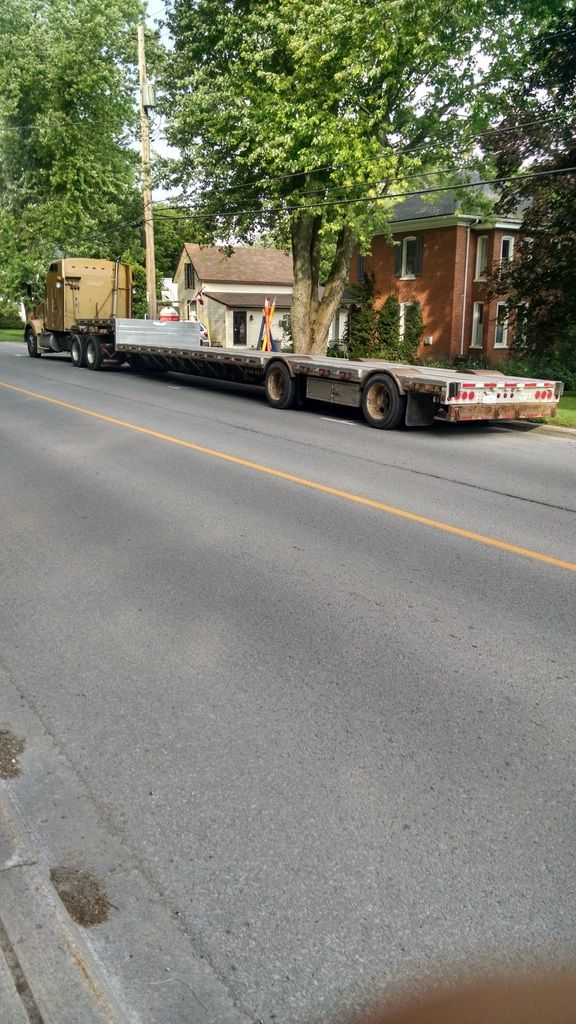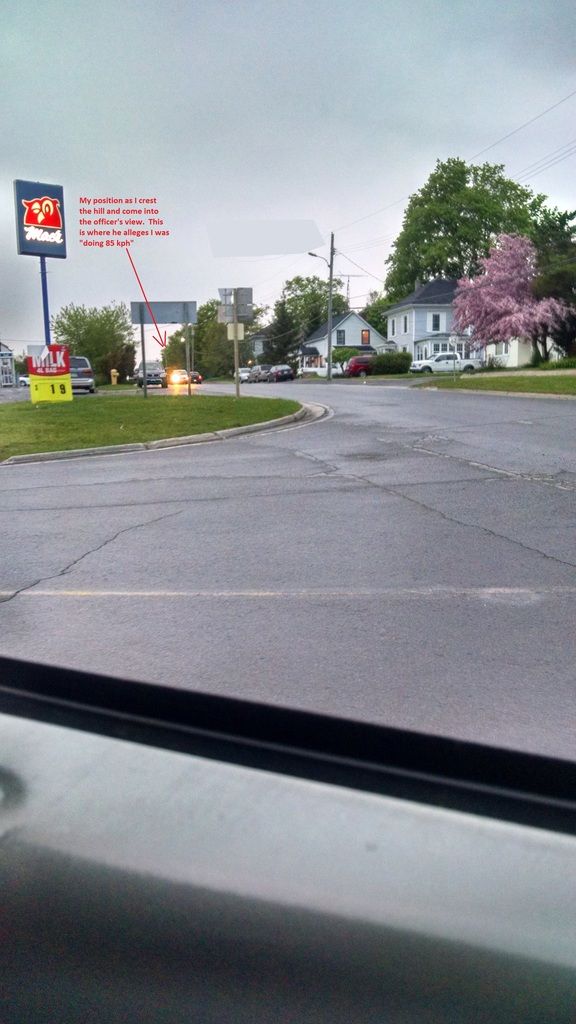Technical Radar Question
All radar talk seems to be about how "the beam" contacts and object and then it gets returned or reflected off that target back to the antenna and the time it takes for this to happen results in a speed. or something like that.
What if "the beam" gets split in half? In your expert opinions, could a radar beam/signal get messed up when the officer shoots this tractor-trailer combination in the back? It seems possible to me that a signal might be returned to the antenna from the rear of the trailer while another signal might be returned from the rear of the truck

Re: Technical Radar Question
Good question.
But I have no idea ![]()
You would need a technical expert in radar to answer that question.
Re: Technical Radar Question
That's why I'm here. They are no doubt thumbing through their training manuals as we speak. ![]()
EDIT: I understand that with moving radar, the radar uses stationary objects to compare the target to, but the same question applies. Is it possible that the extra time and distance that the signal must travel from the rear of trailer to rear of truck could throw the radar off?
Re: Technical Radar Question
Radar has the ability to process many returned signals at once, it will only display the strongest returned signal. So, if there are muliple vehicles in a radar beam, the speed displayed will be from the strongest returned signal. In your tractor and trailer combination, the front of your truck will have a much stronger returned signal due to its size, shape and composition. Not only that...the trailer must be going the same speed as the truck anyway.
Re: Technical Radar Question
Radar does emit a rather wide "beam", so it's possible that it would be striking your cab and trailer at the same time. Unlike laser though, radar isn't measuring the time it takes for the signal to be returned. Radar works by emitting a signal at a known frequency. When the signal strikes a moving object, it gets reflected back at a different frequency. This shift in frequency is how your speed is determined. The frequency shift would be the same if the object was at 10 feet or 1,000 feet. So even if the radar was getting a signal return from both your trailer and cab at the same time, the reading would be the same for both.
If your trailer and cab were somehow moving at two different speeds, the radar would get then get two separate readings. The radar would then display a reading for the strongest signal or, if selected by the operator, the fastest speed returned.
Re: Technical Radar Question
" I understand that with moving radar, the radar uses stationary objects to compare the target to"
Not so...In the moving mode, it is the police vehicle that establishes its patrol speed from stationary objects, such as, the ground in front, rock cuts, signs and such. Stationary objects have nothing to do with getting the target speed.
Re: Technical Radar Question
Stanton, ....comes back at a different frequency......I see. That's why the tuning forks were used to check the target acquisition accuracy. Thanks.
EDIT:I can't get my head around how the something as simple as target speed can change the frequency of a radar signal. Gonna have to google how radar works in a little depth.
Screech....Ok so the police car uses the stationary objects but....(just a point of clarification here for me).....must be the radar in the police car sending a separate signal out to pick the stationary objects then....i.e. one signal for the target and another different signal for the stationary targets?
Re: Technical Radar Question
It's just one signal (beam). The easiest way to explain it is: The strongest signal returned is used as the patrol speed of the police vehicle and the second strongest signal is the target.
Inside the radar, the single signal actually gets split to do the calculation of a patrol speed and target speed.
Re: Technical Radar Question
My guy was sitting at a stop sign as I passed in front of him, allegedly at approx 80-85 kph in a 50. His notes say that he turned right, activated same direction and locked my speed at 72 when he was 30-40 meters behind me and his patrol speed was 60 kph.
1. How long does it take to activate same direction? I understand he has to press and hold a button?
2. For him to be telling the truth, he must have peeled away from that stop sign at a pretty good clip. Can rapid acceleration of the car or engine produce high target readings or inaccurate stationary readings?
3. Nowhere in his notes does he mention that he turned the radar on so I assume he was traveling with the radar on before he reached the stop sign. If he had to turn the radar on, how long does that take?
Re: Technical Radar Question
Decatur wrote:It's just one signal (beam). The easiest way to explain it is: The strongest signal returned is used as the patrol speed of the police vehicle and the second strongest signal is the target.Inside the radar, the single signal actually gets split to do the calculation of a patrol speed and target speed.
Ok well then I must have been a pretty strong target. How do we know the radar wasn't shadowing?
Re: Technical Radar Question
Here is an interesting side note... how does he know you were doing 80 to 85 when you went by him at the stop sign? At a 90 degree angle (with head facing straight ahead) the radar will read 0.
Is this just officers estimation of your speed as you passed in front of him?
The head of the radar unit must be mounted somewhere on the vehicle for moving radar (hand held radar is not used in moving mode). Was the head moveable, meaning he can turn it 90 degrees to face left/right and then back to straight ahead as he pulls in behind you? I think (not 100% sure) they are usually mounted straight ahead and are not moveable.
Re: Technical Radar Question
rank wrote:EDIT:I can't get my head around how the something as simple as target speed can change the frequency of a radar signal. Gonna have to google how radar works in a little depth.
Probably one of the best analogies is from the wikipedia page on doppler radar:
Imagine a baseball pitcher throwing one ball every second to a catcher (a frequency of 1 ball per second). Assuming the balls travel at a constant velocity and the pitcher is stationary, the catcher catches one ball every second. However, if the pitcher is jogging towards the catcher, the catcher catches balls more frequently because the balls are less spaced out (the frequency increases). The inverse is true if the pitcher is moving away from the man. He catches balls less frequently because of the pitcher's backward motion (the frequency decreases). If the pitcher moves at an angle, but at the same speed, the frequency variation at which the receiver catches balls is less, as the distance between the two changes more slowly.
From the point of view of the pitcher, the frequency remains constant (whether he's throwing balls or transmitting microwaves). Since with electromagnetic radiation like microwaves frequency is inversely proportional to wavelength, the wavelength of the waves is also affected. Thus, the relative difference in velocity between a source and an observer is what gives rise to the doppler effect.
Re: Technical Radar Question
Jsherk, He said he could tell just by looking because he is that good From the time I crested the hill and came into view to the intersection is ~40 meters. That is less than 2 seconds at 85 kph. Not much of a tracking history.
Anyone would have to be INSANE to enter town at that speed. Pic below is taken from the officer's exact vantage point and I crested the hill coming toward him as he sat at the intersection.

Re: Technical Radar Question
That's an easy skill to learn if you are using radar or lidar regularly and be within +/- 5 km/h ever time.
Re: Technical Radar Question
Decatur wrote:That's an easy skill to learn if you are using radar or lidar regularly and be within +/- 5 km/h ever time.
He was off by 26 kph.
However I don't think he's that incompetent. He pulled in behind me and realized that he missed his chance because I was already down to ~45-50 from 59. So he just bided his time and got me outside of town. Made sure to wait until I was over 65. I'm sure the tactic has been used before.
-
- Similar Topics
-
-
New post Technical question about failure to provide car ownership
by Agentz in General TalkLast post by Agentz Fri Mar 09, 2012 8:15 pm
-
-
-
New post General question about Police radar conduct
by Krynge in General TalkLast post by hwybear Thu Jan 12, 2012 11:20 am
-
-
-
New post I don't know if the cop used a radar or not - what next?
by littleredecho in General TalkLast post by hwybear Thu Feb 09, 2012 11:36 am
-
-
-
New post 30k over and need a key to get out of the radar trap
Last post by candu238 Sat Dec 17, 2011 11:57 pm
-
-
-
New post 30 over i need help he said he hade me on radar he was going
Last post by Radar Identified Fri Jul 03, 2009 3:04 pm
-
Who is online
Users browsing this forum: No registered users and 7 guests